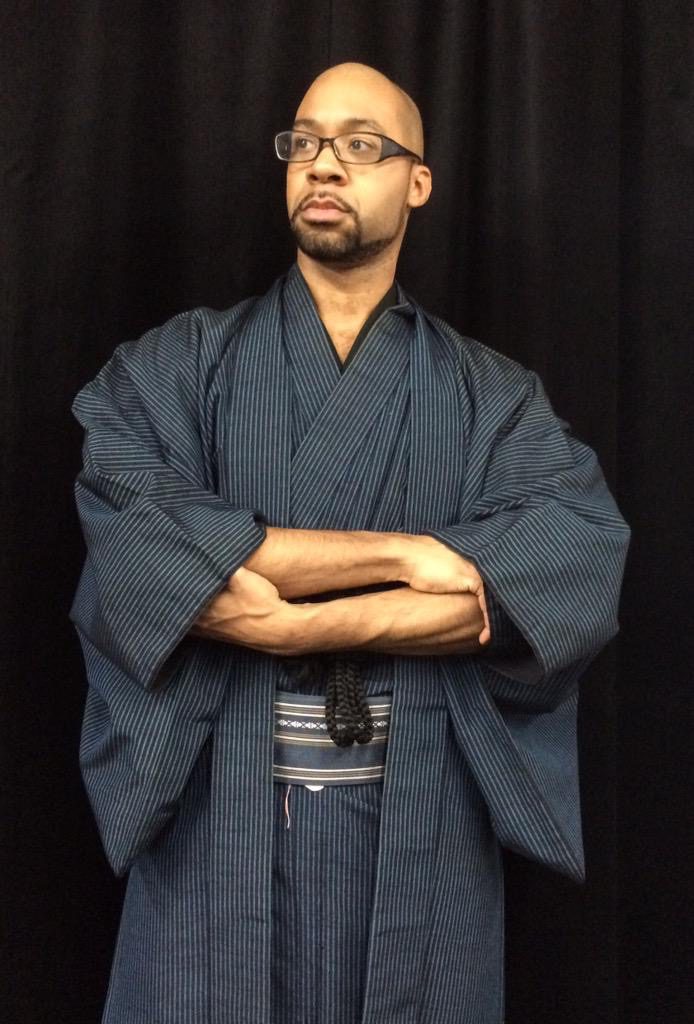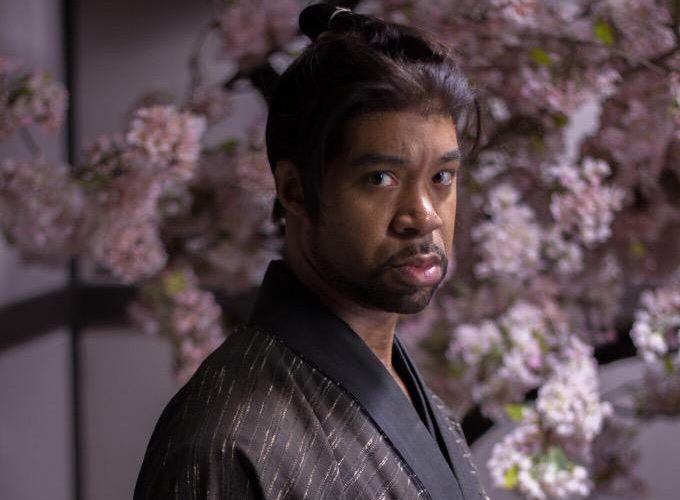I got a chance to sit down with professional stuntman, acclaimed actor and most recently, movie producer, Chuck Johnson.
This modern day Renaissance man has been living overseas and traveling the world for the past 25 years and living a life that some of us can only dream of. With the successful action-comedy, Fists of Absinthe and the highly anticipated action-drama, Eastbound Traffic, Chuck is carving his own lane as a visionary storyteller in the film industry. Here is our interview.

It’s great to finally sit down with you Mr. Chuck Johnson. Can you just start by telling me about your Dojo?
Please. Call me Chuck. When I first came to Japan, I was doing a lot of work as a bodyguard because of my martial arts experience and large stature; but as a martial arts master, it ate at me that I wasn’t sharing what I knew with anyone. Having lived and trained all over Asia, I had this really deep and rich knowledge about martial arts that no one else was benefiting from. I thought to myself, “Before I’m too old, let me share this with people.” That’s pretty much how the Quiet Flame Dojo started. I never advertised at all, but the school just organically grew by itself really, really quickly. As for the stunt team, it started because, for a long time, I was Japan’s only foreign stunt person. More and more, the stunt coordinators I worked with were asking me if I had any other stunt performers. I didn’t, so that prompted me to train other martial artists and actors on how to become stunt people. During those training sessions, one of the things that I discovered is that generally, you get better stunt people when they’re trained martial artists because they’re more disciplined and focused. On the other side of the coin, actors who study martial arts and stunts also perform better because they have stronger physicality, and are more comfortable and confident with their bodies and what they can do. So, eventually Quiet Flame evolved into an actor’s training institution where we focus on increasing actors’ physicality through studying a wide range of movements, but where we also train stunt people in real martial arts and acting. It’s a fascinating place because everyone comes from such different backgrounds. I’ve got comedians, singers, dancers, and dramatic actors, but the commonality is that we all train together so over time, regardless of their background, everyone moves really well, haha.
Oh wow! So it’s actually a stunt school as well as a martial arts studio?
Yeah. So we teach stunts, wire work, tactical firearms, everything, and of course the martial arts school is a big part of it as well. The first action director I studied under, Yuji Shimomura, (who is now one of the top 3 action directors in Japan) always told me that it’s better to learn real martial arts and then adapt it to the camera than to only study fight choreography alone. Doing so means that you know how to maintain the underlying form of real fighting and make it more believable. All actors have to do some kind of action or fight scene from time to time; and having a base in real martial arts makes a huge difference. When you know how to hit with power, you know how a powerful hit is supposed to look and feel and how the body would react to it. From there, you can figure out how to “sell” it without actually having to hit someone hard or hurt them. Beyond that, as aforementioned, it just generally makes them better performers because they generally have a better physical sense of themselves and their bodies.
That’s pretty crazy. I didn’t know that. So how did you get into stunts?
When I was in my early 20s in Tokyo, there were very few African Americans, and generally few people of my size and build. A friend suggested that I model.. I walked into a modeling /acting agency and they were looking for martial artists for the film Godzilla: Final Wars to play super soldiers. By the time I entered the agency, the casting had already closed, but they submitted me anyway and the casting director asked me to come in and audition. I ended up getting into the film. While I was on set, I met Shimomura-san (who I mentioned earlier) and he suggested that I come and train with him and his team. At the time, I didn’t speak a word of Japanese, so I was basically learning everything just from watching and following. Then, I thought, I need to study this in English, and I started going back and forth to the states to study and try and work. I went to the International Stunt School in Seattle to study utility stunts and then I went to the Society of American Film Directors to start studying stage combat. I was still working as an actor as well, so I started taking acting classes at the same time.

And then you made the transition to directing?
I started directing because I actually met a producer from Hollywood who had been in a bad street situation. He said he tried to watch some self-defense tutorials on YouTube, but they were all way too hard or technical to understand; so he asked me if I could make a self-defense course for normal people, and if so, he might be interested in investing in it. At the end of the day, the investment didn’t happen, but I had started it, so I decided to see it through anyway funding it on my own. I called it How to Defeat Dudes, and it was a light-hearted, comical self-defense show, based on real experiences I had from bodyguarding and 20 years of fighting. It had a lot of success on YouTube, and amy channel grew by about 1600% in the two years I was doing it regularly. That garnered the interest of YouTube Japan and they ended up funding a script I wrote called Fists of Absinthe: a time slip comedy about a samurai-obsessed American, who drinks Absinthe, and then hallucinates that he’s in ancient Japan and has to defend his Adidas from samurai. They loved it. It got backing from Google and Adidas even promoted everything on social media and gave everybody on my stunt team sneakers. We ended up getting a distribution deal from TBS Digital Distribution in Japan.
It’s very exciting that you have this new film coming out. So, how did you make the transition from Fists of Absinthe to Eastbound Traffic? Where did that idea come from?
The reason that I wanted to make Eastbound Traffic was because early on in my career, I needed a job that would allow me to have my day time free so I could focus on getting work, and training. I ended up working as a stripper at this really shady club, and I could see all these women from Southeast Asia and all these women from Eastern Europe that were just being brought in. You never knew anyone’s last name, and at the time, there was no such thing as social media, so sometimes they would just disappear, and you would never know what happened to them. Others would come in with huge bruises and they would never talk about why. Almost all of them would come in fresh-faced and excited for a new life in a foreign country and within a few months would get twisted into dark and bitter people. After witnessing what I witnessed, I always thought that, once I got to a position to do so, I would tell their stories.
What is the overall vision you have for Eastbound Traffic and your company, Quiet Flame Productions?
With Eastbound Traffic, I want to bring awareness to this issue. Sex trafficking is something that happens everywhere. Not just in Japan, but where I’m from too, in Detroit, and everywhere else. This is an issue that affects not just CIS women,but trans women, and sadly even children all over the world. I want to show what this does to people and why it’s happening, but through the lens of the film genre that I know best; action. On a larger scale, this is what I believe to be the role of Quiet Flame. My father was a peace activist himself, and I traveled to 33 countries around the world through peace activism and the study of environmental, social and political issues that are having a real impact on people’s lives.
I want to create really intelligent, socially-conscious action films; and I believe, with my background, I can do that, and bring something new and fresh to the film industry.
That sounds like something audiences are really going to gravitate towards. We will go ahead and wrap it up. For our readers who haven’t seen your viral hit film “Fists of Absinthe”, where can they view that?
As our distribution deal was only for the Japanese domestic market, and Youtube was the co-producer, we had permission to release it internationally on Youtube and also on Amazon Prime. It’s a light-hearted film and if you want to see a drunken Samurai action comedy movie it’s definitely worth your time to check out.


